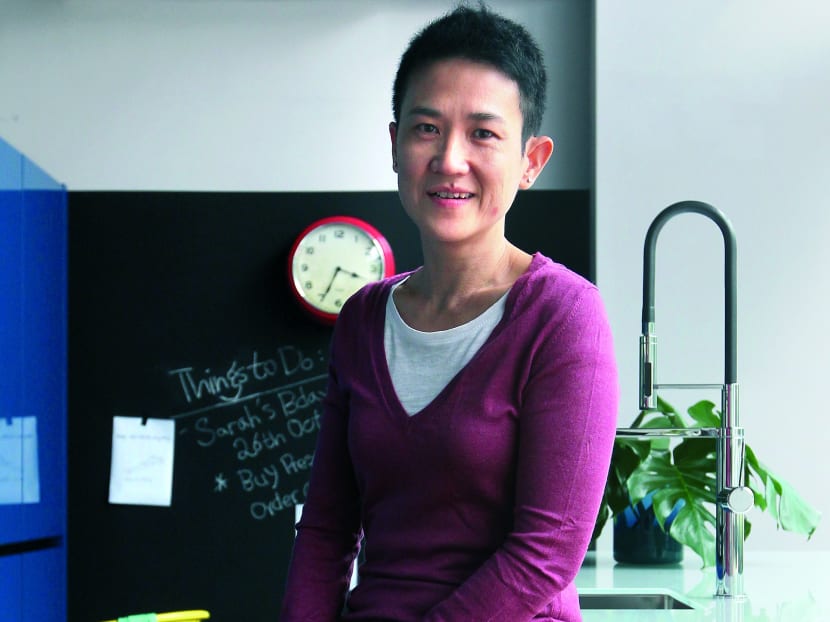Cooking up a recipe for success
SINGAPORE — Walk into the showroom of home interiors firm Mudian Crafted and the first thing one encounters is the re-creation of a vintage kitchen commonly found in Singapore homes in the ’60s and ’70s. Wooden clogs sit at the foot of a stove, while to the side sits a cupboard that used to hold live chickens before they were slaughtered.

Mudian Crafted co-founder Calsia Lee wants to produce kitchens that are designed to grow with the home owners. Photo: Don Wong
SINGAPORE — Walk into the showroom of home interiors firm Mudian Crafted and the first thing one encounters is the re-creation of a vintage kitchen commonly found in Singapore homes in the ’60s and ’70s. Wooden clogs sit at the foot of a stove, while to the side sits a cupboard that used to hold live chickens before they were slaughtered.
The inspiration for the culinary nostalgia trip comes courtesy of the company’s co-founder Calsia Lee, who modelled it based on memories of hours spent in her grandmother’s kitchen in the kampung she grew up in.
Step away from that imagined space, however, and one is quickly snapped back to the present. Indeed, the rest of the showroom features innovative ideas of how a kitchen or a wardrobe can be put together in contemporary Singapore.
In a nutshell, Mudian’s products are an alluring swirl of modular designs coupled with quality craftsmanship and green materials. The results are affordable offerings — a typical kitchen for a four-room Housing and Development Board flat or a two bedroom private apartment can be had for less than S$10,000 — that look anything but cheap.
Ms Lee, 44, and another partner, Selina Tay, 49 started the company 16 years ago in a small workshop in Toa Payoh with only six carpenters. Today, that number has grown to 32, while revenue now stands at over S$4 million. But the entrepreneurial road for the partners has been littered with aborted employee revolts, personal snubs from clients and hostile contractors.
“In our own factory, we had workers not believing what we said just because we were girls, and once when I arrived at a client’s place, he asked me, ‘Why didn’t you send the boss?’, and I had to tell him I am the boss,” she said.
There were also many instances of contractors telling her they could not execute the firm’s designs, even though it was clear to Ms Lee that it was possible. Despite the obstacles, she never thought of giving up.
“One even told me to ‘stay home to wash and cook’. But I’m very thick-skinned and I don’t give up so easily, especially when this industry is so male-dominated,” she said.
Business was tough until the partners attended a trade show 11 years ago and discovered machines that could help with the carpentry work. Not only would the equipment improve productivity, but it would also allow the two women to do some of the work themselves.
There was only problem: All their carpenters refused to use them.
“It took us six months to convince them. My female colleague and I said we do it ourselves if they didn’t want to. We wanted to show them that no one was indispensible,” she said.
Earlier this year, they moved into their new 8,000 sq ft showroom and launched a new line of kitchens and wardrobes that feature a modular concept, allowing buyers to mix and match components.
Ms Lee was inspired to produce kitchens that were designed for locals, and which could grow with the home owners. “We wanted to build kitchens that are functional and can grow with you, from a single person to a married couple to a family with kids. We wanted also to be environmentally friendly.
“Growing up in the kampung, I saw how, when a house was torn down, the wood was used as firewood. Many things were recycled like that,” she said.
While success has brought an end to the gender bias she used to face, discrimination in another form still remains. Certain property developers, she revealed, insist on having international brands to fill their interiors for branding purposes.
“It is such a shame because we are just as good and we better understand the lifestyle of home owners,” she said. For instance, European-made kitchens have countertops that are generally 90cm to 92cm, making it difficult for shorter Asians to use comfortably.
She is also passionate about upgrading the skills of the carpentry profession. To help train more practitioners, she has set up a programme to train candidates — some of them school dropouts — in the art of carpentry. Of her initial batch of 10 students, however, only two remain. If they complete the training, they will eventually be hired as apprentices by Mudian and be paid a monthly salary ranging from S$1,500 to S$1,800.
But regardless of the challenges ahead, whether it is convincing developers to go local or attracting new talent to the business, Ms Lee is not ready to give up without a big fight.





